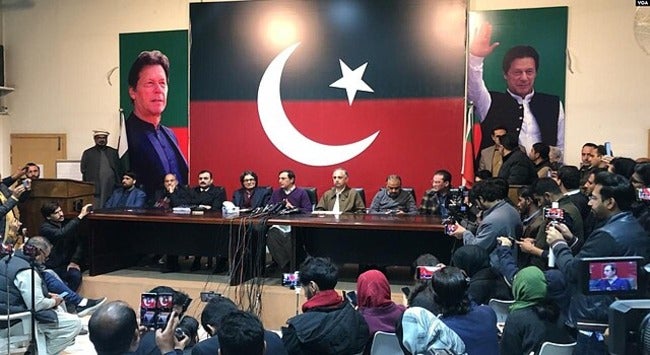Uncertainty and Dissent:
Leadership Crisis in the PTI
Imran Ahmed, Muhammad Saad Ul Haque
28 June 2024Summary
The Pakistan-Tehreek-e-Insaaf (PTI) at present faces significant internal strife and external challenges, including jailed leaders, legal hurdles, political harassment, a fraught partnership with the Sunni Ittehad Council and mounting internal dissent. This has raised concerns about its unity, its effectiveness as an opposition force and its overall stability. Despite the passing of several months since the turbulent election period, the future of the PTI and its leadership remains uncertain. Power struggles among senior PTI leaders exacerbate leadership instability and risk eroding the PTI’s public image and political standing.
Starting with the no-confidence movement, the Pakistan-Tehreek-e-Insaaf has seen members jailed, harassed and banned from entering politics, including its esteemed leader, former prime minister, Imran Khan, who is currently in jail on multiple charges.
In the February 2024 elections, the PTI’s candidates ran as independents after the party’s symbol was banned by the Election Commission. After the elections, the PTI joined the Sunni Ittehad Council (SIC) but the Commission later declared that the coalition could not claim reserved seats. Reserved seats ensure the representation of underrepresented groups. These seats are allocated proportionally based on the number of general seats a party wins. The coalition’s failure to secure reserved seats led to mounting frustrations, with some PTI leaders questioning the partnership’s efficacy.
Sher Afzal Marwat, a vocal PTI leader, criticised his party’s alliance with the SIC, expressing disappointment over their failure to secure reserved seats. This sentiment has also been echoed by others like Walid Iqbal, who viewed the partnership as a mistake. Conversely, the SIC’s Chairman, Sahibzada Hamid Raza, publicly voiced dissatisfaction with the PTI’s negotiations with Jamiat Ulema-i-Islam-Fazl (JUI-F), accusing the PTI of exploiting the JUI-F’s exclusion from the Pakistan People’s Party-Pakistan Muslim League-Nawaz coalition. The JUI-F was a member of the Pakistan Democratic Movement, the coalition that orchestrated the PTI government’s removal via a no-confidence vote, but the PTI expressed interest in potentially including the JUI-F as part of its coalition opposition.
While these issues underscore rifts within the alliance, the PTI’s primary concern currently lies with its internal divisions. Numerous reports have highlighted disagreements among top PTI leaders, including Asad Quaiser, Shibli Faraz, Omar Ayub, Gohar Ali and Sher Afzal. Sher Afzal, a charismatic and outspoken figure within the PTI, has notably seen a decline in influence due to his objection to the party leadership’s policies. In recent months, Marwat has been replaced by Waqas Akram as the Public Accounts Committee Chief, and he has been removed from the party’s core leadership committees and barred from meeting Khan in jail. He has also declined to collaborate with senior leaders Faraz and Ayub, whom he accuses of deceiving Khan. According to the PTI’s chairperson, Ali, Afzal’s exclusion from leadership roles was according to Khan’s directive.
For the PTI, this is a significant concern. Over the past year, Afzal has garnered substantial support for staunchly defending Khan and the party. With Khan and former foreign minister, Shah Mahmood Quereshi, in prison, ongoing disagreements risk alienating prominent leadership figures. The departure of influential leaders in the aftermath of the 8 May 2024 protests, including Jahangir Tareen and Asad Umar, created a leadership vacuum and significant upheavals within the PTI. It prompted a period of uncertainty and reshuffled alliances. Moreover, some reports suggest discontent among other PTI members, such as Shahryar Afridi, who have criticised the party’s senior leadership. These internal rifts jeopardise the PTI’s ability to present a unified front against the Shehbaz Sharif-led coalition. Most recently, former PTI leader, Chaudhry Fawad Hussain, criticised Khan’s prolonged incarceration, attributing it to the current PTI leadership’s inadequate political strategy.
The true extent of the impact of these internal divisions on Khan and his leadership remains uncertain, though a recent meeting where party leaders pledged unity signals an effort to manage public perception. Just how effectively the party can present a united front will likely influence its ability to navigate its external political challenges. These internal rifts may also affect the PTI’s strategic decisions and its capacity to mobilise resources and supporters. Finally, the ongoing internal discord has the potential of undermining the party’s ability to effectively counter opposition alliances and maintain cohesion in its legislative agenda, address pressing national issues and deliver on electoral promises, thereby impacting its credibility both domestically and internationally.
. . . . .
Dr Imran Ahmed is a Research Fellow at the Institute of South Asian Studies (ISAS), an autonomous research institute in the National University of Singapore (NUS). He can be contacted at iahmed@nus.edu.sg. Mr Muhammad Saad Ul Haque is a research analyst at the same institute. He can be contacted at msaaduh@nus.edu.sg. The authors bear full responsibility for the facts cited and opinions expressed in this paper.
Pic Credit: Wikimedia Commons
-
 More From :
More From :
-
 Tags :
Tags :
-
 Download PDF
Download PDF



